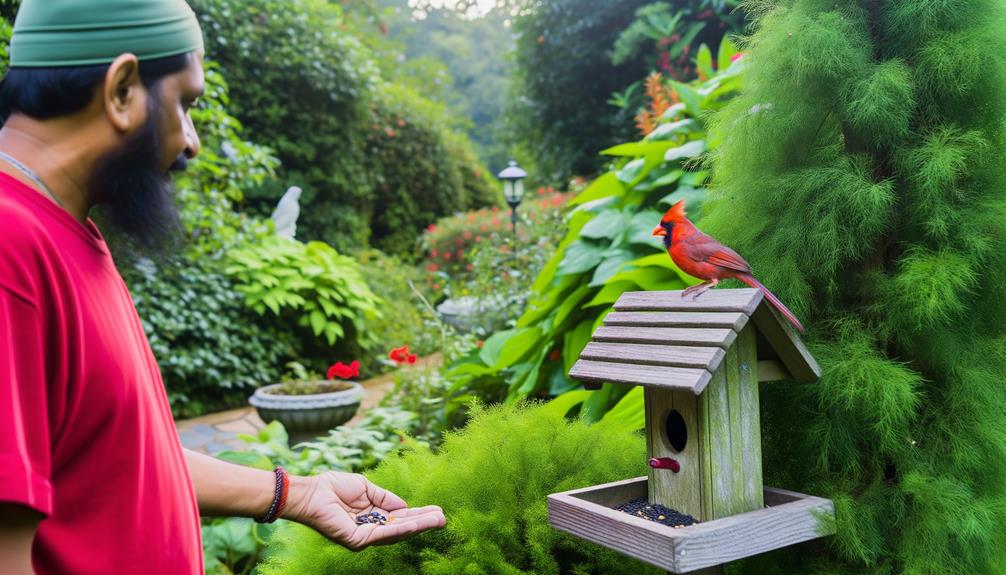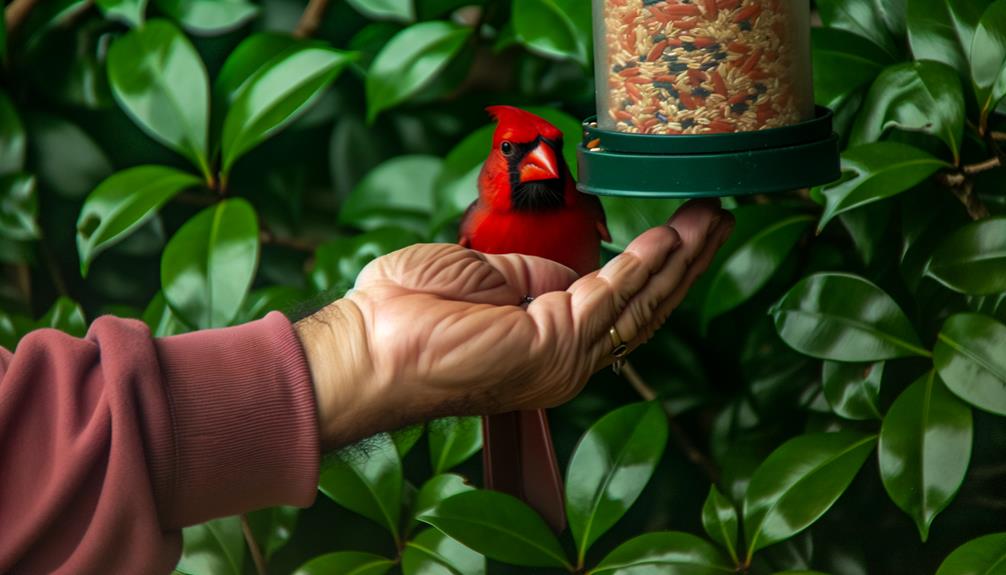Do Cardinals Recognize Humans Who Feed Them?
Yes, cardinals recognize humans who feed them. These birds have impressive memory and recognition skills, enabling them to distinguish and remember specific individuals.
When you consistently feed them, they associate your actions with food, creating a predictable environment. As cardinals build this familiarity, you'll notice changes in their behavior, such as reduced skittishness and even perching closer to you.
Birdwatchers often observe cardinals appearing at the same time each day, potentially following known feeders around the yard. Setting up a feeder with sunflower seeds can encourage regular visits, offering further fascinating insights into their behavior.

Key Takeaways
- Cardinals can distinguish between human faces and recognize consistent feeders.
- They recall specific feeders through their impressive memory and spatial recognition abilities.
- Consistent feeding can reduce their skittishness around familiar humans.
- Cardinals may perch closer and follow known feeders around the yard.
- They can associate specific actions with food availability, creating predictable behaviors.
Cardinal Behavior and Habits

Cardinals exhibit a range of fascinating behaviors and habits that reveal much about their daily lives and survival strategies. You'll notice that cardinals are highly territorial, often defending their space with impressive fervor.
Males, with their bright red plumage, are particularly vigilant, engaging in elaborate songs to mark their territory. They're also monogamous, forming strong pair bonds with their mates.
Nesting habits are meticulous; they choose dense shrubs or trees, constructing nests with twigs, leaves, and grasses. Cardinals are ground feeders, primarily consuming seeds, but they won't shy away from insects and fruits.
Their plumage isn't just for show; it plays an important role in mate attraction and survival. By observing these behaviors, you can appreciate the intricate life of cardinals.
Human-Bird Interaction Studies
Numerous studies have explored how birds, including cardinals, recognize and respond to human presence, shedding light on the intricate dynamics of human-bird interactions. When you feed cardinals consistently, researchers have noted changes in their behavior. They may become less skittish and more inclined to approach you.
Observational studies reveal that cardinals learn to associate specific human actions, like filling a feeder, with food availability. By maintaining a routine, you're effectively communicating with these birds, creating a predictable environment they can adapt to.
This interaction isn't just one-sided; it benefits you too, as you gain insight into their natural behaviors and rhythms, fostering a deeper connection with the natural world around you.
Memory and Recognition Abilities

Ever wondered how well cardinals can remember and recognize the individuals who feed them? Cardinals, like many avians, possess impressive memory and recognition abilities. Studies show that they can distinguish between different human faces and remember specific feeders.
Their brain's hippocampus, essential for spatial memory, allows cardinals to recall feeding locations and the people associated with them. They observe your behaviors, clothing, and even the timing of your visits. Through consistent interaction, you create a memory trace in their minds.
This cognitive ability ensures they return to reliable food sources. So, next time you fill that feeder, know that your feathered friends aren't just eating—they're remembering you.
Anecdotal Evidence From Birdwatchers
Many birdwatchers have shared compelling stories that suggest cardinals not only remember but also form bonds with the humans who consistently feed them. When you observe these vibrant birds, you'll notice a pattern: cardinals often become less skittish around familiar faces.
For instance, some birdwatchers report that cardinals will perch closer and even chirp more softly when a known feeder is present. Detailed logs from enthusiasts show that cardinals tend to appear at the same time each day, as if expecting their human friend.
Additionally, some observers have noted cardinals following them around their yard or garden, seemingly recognizing and trusting their benefactor. These anecdotal accounts provide intriguing insights into the potential for cardinals to form unique, lasting connections with humans.
Encouraging Cardinal Visits

To attract cardinals to your yard, provide a consistent supply of sunflower seeds and install feeders in quiet, sheltered locations. Opt for black-oil sunflower seeds as they're nutrient-rich and easy for cardinals to crack open.
Keep feeders at least five feet off the ground to deter predators. Plant dense shrubs and trees nearby for extra cover; cardinals appreciate the protection. Guarantee a reliable water source, like a birdbath, especially in winter when water is scarce.
Regularly clean feeders to prevent disease. Monitor cardinal activity and adjust feeding times to match their natural habits. By fostering a safe, resource-rich environment, you'll not only encourage cardinal visits but also create a sanctuary for these vibrant birds to thrive.
Conclusion
You might wonder if cardinals truly recognize you, considering their small brains. However, studies show that birds, including cardinals, possess impressive memory and recognition abilities.
Observations and anecdotes from birdwatchers support that cardinals can recall and respond to familiar humans. So, keep feeding them consistently.
You'll likely notice the same vibrant red visitors returning to your yard, proving that these beautiful creatures do indeed recognize and appreciate your efforts.






